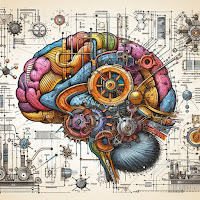Gandhi's Copyright Pragmatism
Earlier today, Carl Malamud tweeted a link to a fascinating paper about the evolution and reasons for Gandhi's prescient views and use of copyright law during his life. The combination of historical narrative, interdisciplinary research and discussion, and copyright was enough to take over the start of my Sunday afternoon. Read the abstract and download the full paper by Professor Shyamkrishna Balganesh here.
The paper traces Gandhi's views during his most prolific writing periods, and anchors its analysis with examples showing three key phases: personal rejection [of copyright], reluctant engagement and strategic deployment. The first phase largely coincides with Gandhi's rejection of utilitarian philosophy primarily out of concern that minority voices would be drowned out or ignored, along with other reasons. The second is illustrated by the example of granting US and UK rights to a publisher for an autobiographical work, which Gandhi perceived as an appropriate compromise. The final phase foreshadowed the explicit disaggregation of the copyright bundle in mid-late 20th century statutes and licensing (including copyleft, Creative Commons) of the early 21st century. It uses the example of Gandhi exercising copyright in newspaper articles to preserve the right of first translation in light of translations that distorted the meaning, or were not as accurate as he would have liked. After translating himself, the works remained freely available.
Through the lens of copyright, the paper traces the various philosophical threads in Gandhi's approach to property, emphasis on the legal concept of trustees and trusteeship, and focus on duties instead of assuming rights. The paper begins by telling the story of how the Navjivan Trust, which held copyrights to his work after death, decided to dedicate them to the public domain in 2008 rather than lobby for extensions of copyright. (Gandhi died in 1948. Under the law in effect, a term of life plus sixty years applied.) It goes on to explore the points noted in the paragraph above, along with commercial and profit-oriented considerations and the little known (to me, at least) fact that Gandhi initially trained as a barrister (aka a lawyer focused on courtroom appearances and similar work) before turning toward activism. Other interesting sub-plots appear throughout, such as Gandhi's acceptance of the value of acknowledging any changes in opinions while pursuing one's conception of truth. The author quotes one of Gandhi's letters, in which he emphasizes that, "when anybody finds any inconsistency between any two writings of mine, if he has still faith in my sanity, he would do well to choose the later of the two on the same subject. "
In discussing the contemporaneous rise of legal pragmatism in the United States, the author also speculates as to the historical or other reasons for the dual discovery and adherence to similar ideals by Gandhi. I'd urge the curious reader to check out the full paper. This safe-for-non-lawyers piece reads more like a multi-part magazine article than law review entry and shines some interesting light on 20th century legal philosophy, Gandhi's life and a perspective on copyright law often lacking in the literature.
The paper traces Gandhi's views during his most prolific writing periods, and anchors its analysis with examples showing three key phases: personal rejection [of copyright], reluctant engagement and strategic deployment. The first phase largely coincides with Gandhi's rejection of utilitarian philosophy primarily out of concern that minority voices would be drowned out or ignored, along with other reasons. The second is illustrated by the example of granting US and UK rights to a publisher for an autobiographical work, which Gandhi perceived as an appropriate compromise. The final phase foreshadowed the explicit disaggregation of the copyright bundle in mid-late 20th century statutes and licensing (including copyleft, Creative Commons) of the early 21st century. It uses the example of Gandhi exercising copyright in newspaper articles to preserve the right of first translation in light of translations that distorted the meaning, or were not as accurate as he would have liked. After translating himself, the works remained freely available.
Through the lens of copyright, the paper traces the various philosophical threads in Gandhi's approach to property, emphasis on the legal concept of trustees and trusteeship, and focus on duties instead of assuming rights. The paper begins by telling the story of how the Navjivan Trust, which held copyrights to his work after death, decided to dedicate them to the public domain in 2008 rather than lobby for extensions of copyright. (Gandhi died in 1948. Under the law in effect, a term of life plus sixty years applied.) It goes on to explore the points noted in the paragraph above, along with commercial and profit-oriented considerations and the little known (to me, at least) fact that Gandhi initially trained as a barrister (aka a lawyer focused on courtroom appearances and similar work) before turning toward activism. Other interesting sub-plots appear throughout, such as Gandhi's acceptance of the value of acknowledging any changes in opinions while pursuing one's conception of truth. The author quotes one of Gandhi's letters, in which he emphasizes that, "when anybody finds any inconsistency between any two writings of mine, if he has still faith in my sanity, he would do well to choose the later of the two on the same subject. "
In discussing the contemporaneous rise of legal pragmatism in the United States, the author also speculates as to the historical or other reasons for the dual discovery and adherence to similar ideals by Gandhi. I'd urge the curious reader to check out the full paper. This safe-for-non-lawyers piece reads more like a multi-part magazine article than law review entry and shines some interesting light on 20th century legal philosophy, Gandhi's life and a perspective on copyright law often lacking in the literature.
